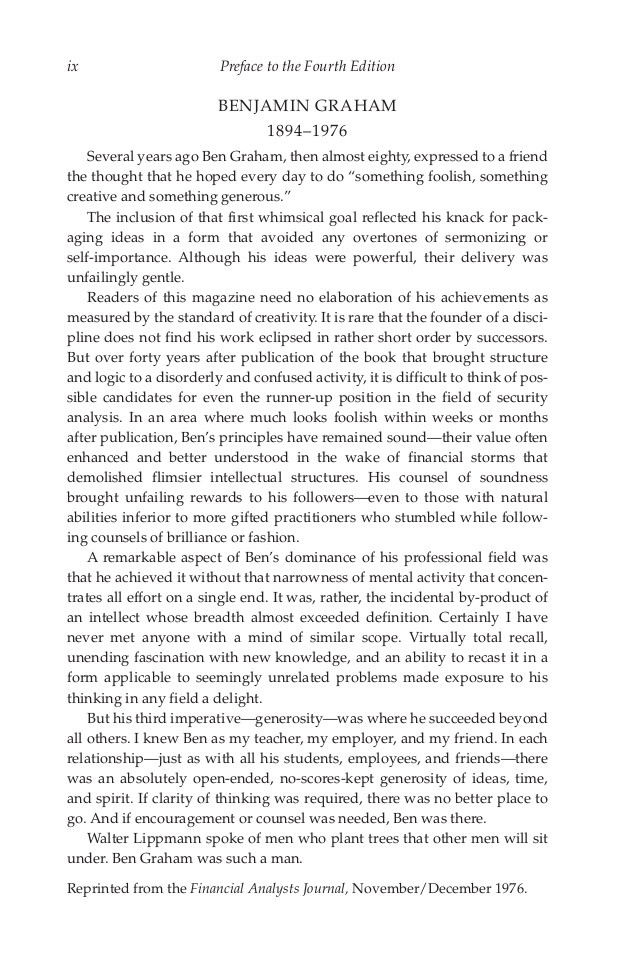Benjamin Graham’s Three Key Investment Principles
Post on: 16 Март, 2015 No Comment

- Page Title:
- Page URL:
This page has been successfully added into your Bookmark.
29 followers
Follow
Benjamin Graham is considered the father of value investing, and his investment principles are considered timeless. In his book, The Intelligent Investor, he outlines three key investment principles when, if followed, will lead one to a more sure path of investing. These three principles are:
Principle Number One: Stock Is Part Ownership in a Business
A stock is part ownership in a real business, not just a piece of paper that people trade back and forth (or a ticker that dances up and down with peoples emotions).
In Benjamin Graham’s words: …every corporate security may best be viewed, in the first instance, as an ownership interest in, or a claim against, a specific business enterprise. (pg. 523, The Intelligent Investor – 1973 Revised Edition, Benjamin Graham)

Principle Number Two: Margin of Safety
Confronted with a … challenge to distill the secret of sound investment into three words, we venture the motto, MARGIN OF SAFETY. (pg. 512, The Intelligent Investor – 1973 Revised Edition, Benjamin Graham)
The margin-of-safety idea becomes much more evident when we apply it to the field of undervalued or bargain securities. We have here, by definition, a favorable difference between price on the one hand and indicated or appraised value on the other. That difference is the safety margin. It is available for absorbing the effect of miscalculations or worse than average luck. The buyer of bargain issues places particular emphasis on the ability of the investment to withstand adverse developments. (pg. 518, The Intelligent Investor – 1973 Revised Edition, Benjamin Graham)
Principle Number Three: Mr. Market
Imagine that in some private business you own a small share that costs you $1,000. One of your partners, named Mr. Market, is very obliging indeed. Every day he tells you what he thinks your interest is worth and furthermore offers either to buy you out or to sell you an additional interest on that basis. Sometimes his idea of value appears plausible and justified by business developments and prospects as you know them. Often, on the other hand, Mr. Market lets his enthusiasm or his fears run away with him, and the value he proposes seems to you a little short of silly.
If you are a prudent investor or a sensible businessman, will you let Mr. Market’s daily communication determine your view of the value of a $1,000 interest in the enterprise? Only in case you agree with him, or in case you want to trade with him. You may be happy to sell out to him when he quotes you a ridiculously high price and equally happy to buy from him when his price is low. But the rest of the time you will be wiser to form your own ideas of the value of your holdings, based on full reports from the company about its operations and financial position.
The true investor is in that very position when he owns a listed common stock. He can take advantage of the daily market price or leave it alone, as dictated by his own judgment and inclination…. Basically, price fluctuations have only one significant meaning for the true investor. They provide him with an opportunity to buy wisely when prices fall sharply and to sell wisely when they advance a great deal. At other times he will do better if he forgets about the stock market and pays attention to his dividend returns and to the operating results of his companies.
(pgs. 204-205, The Intelligent Investor – 1973 Revised Edition, Benjamin Graham)
By understanding our relationships to the businesses we own, keeping a margin of safety and acknowledging and not being swayed by Mr. Market we can become better, more confident investors. We can feel more at ease with the highs and lows in the market and taking advantage of them.














